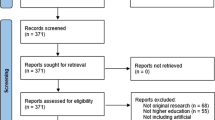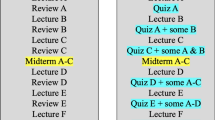Abstract
The aim of this study was to determine if medical students categorised as having deep and strategic approaches to their learning find problem-based learning (PBL) enjoyable and supportive of their learning, and achieve well in the first-year course. Quantitative and qualitative data were gathered from first-year medical students (N = 213). All students completed the Medical Course Learning Questionnaire at the commencement and completion of their first year of medical studies. The instrument measured a number of different aspects of learning, including approaches to learning, preferences for different learning environments, self-efficacy, and perceptions of learning within PBL tutorials. Qualitative data were collected from written responses to open questions. Results of students’ performance on two forms of examinations were obtained for those giving permission (N = 68). Two-step cluster analysis of the cohort’s responses to questions about their learning approaches identified five clusters, three of which represented coherent combinations of learning approaches (deep, deep and strategic, and surface apathetic) and two clusters which had unusual or dissonant combinations. Deep, strategic learners represented 25.8% of the cohort. They were more efficacious, preferred learning environments which support development of understanding and achieved significantly higher scores on the written examination. Strongly positive comments about learning in PBL tutorials were principally described by members of this cluster. This preliminary study employed a technique to categorise a student cohort into subgroups on the basis of their approaches to learning. One, the deep and strategic learners, appeared to be less vulnerable to the stresses of PBS in a medical course. While variation between individual learners will always be considerable, this analysis has enabled classification of a student group that may be less likely to find PBL problematic. Implications for practice and suggestions for future research are proposed.

Similar content being viewed by others
References
Albanese, M. A., & Mitchell, S. (1993). Problem-based learning: A review of the literature on its outcome and implementation issues. Academic Medicine, 68(1), 52–80. doi:10.1097/00001888-199301000-00012.
August-Brady, M. M. (2005). The effect of a metacognitive intervention on approach to and self-regulation of learning in baccalaureate nursing students. Journal of Nursing Education, 44(7), 297–304.
Bandura, A. (1997). Self-efficacy: The exercise of control. New York: Freeman.
Bartholomew, D. J., Steele, F., Moustaki, I., & Galbraith, J. I. (2002). The analysis and interpretation of multivariate data for social scientists. Boca Raton, Florida: Chapman & Hall.
Blumberg, P. (2000). Evaluating the evidence that problem-based learners are self-directed learners: A review of the literature. In D. H. Evenson & C. E. Hmelo (Eds.), Problem-based learning: A research perspective on learning interactions. Mahwah, NJ: Lawrence Erlbaum Associates.
Boekaerts, M. (1997). Self-regulated learning: A new concept embraced by researchers, policy makers, educators, teachers, and students. Learning and Instruction, 7(2), 161–186. doi:10.1016/S0959-4752(96)00015-1.
Butler, D. L., & Winne, P. H. (1995). Feedback and self-regulated learning: A theoretical synthesis. Review of Educational Research, 65(3), 245–281.
Cramer, D. (2003). Advanced quantitative data analysis. Maidenhead, England: Open University Press.
Cuthbert, K. (1998). An action research evaluation of a first-year ‘learning to learn’ unit: The role of reflection and metacognition. In C. Rust (Ed.), Improving student learning: Improving students as learners (pp. 144–153). Oxford: Oxford Centre for Staff and Learning Development.
De Grave, W. S., Boshuizen, H. P. A., & Schmidt, H. G. (1996). Problem-based learning: Cognitive and metacognitive processes during problem analysis. Instructional Science, 24(5), 321–334. doi:10.1007/BF00118111.
Dochy, F., Segers, M., Van den Bossche, P., & Gijbels, D. (2003). Effect of problem-based learning: A meta-analysis. Learning and Instruction, 13(5), 533–568. doi:10.1016/S0959-4752(02)00025-7.
Entwistle, N. (1987). Motivation to learn: Conceptualisations and practicalities. British Journal of Educational Studies, 35(2), 129–148. doi:10.2307/3121441.
Entwistle, D. (1998). Supporting students’ frameworks for conceptual understanding: Knowledge objects and their implications. In C. Rust (Ed.), Improving student learning: Improving students as learners (pp. 206–214). Oxford: Oxford Centre for Staff and Learning Development.
Entwistle, N. (2000). Promoting deep learning through teaching and assessment: Conceptual frameworks and educational contexts. Paper presented at the TLRP Conference, Leicester.
Entwistle, N., & Ramsden, P. (1983). Understanding student learning. London: Croom Helm.
Entwistle, N., McCune, V., & Hounsell, J. (2002). Approaches to studying and perceptions of university teaching-learning environments: Concepts, measures and preliminary findings. Edinburgh: School of Education, University of Edinburgh.
Entwistle, N., Tait, H., & McCune, V. (2000). Patterns of response to an approaches to studying inventory across contrasting groups and contexts. European Journal of Psychology of Education, 15(1), 33–48.
Gallagher, S. A., Stepien, W. J., & Rosenthal, H. (1992). The effects of problem-based learning on problem-solving. Gifted Child Quarterly, 36(4), 195–200. doi:10.1177/001698629203600405.
Gijbels, D., van de Watering, G., Dochy, F., & Van den Bossche, P. (2005). The relationship between students’ approaches to learning and the assessment of learning outcomes. European Journal of Psychology of Education, 10(4), 327–341.
Glaser, G. B., & Strauss, A. L. (1967). Discovery of grounded theory: Strategies for qualitative research. Chicago: Aldine.
Groves, M. (2005). Problem-based learning and learning approach: Is there a relationship? Advances in Health Sciences Education, 10(4), 315–326. doi:10.1007/s10459-005-8556-3.
Hammel, J., Royeen, C. B., Bagatell, N., Chandler, B., Jensen, G., Loveland, J., et al. (1999). Student perspectives on problem-based learning in an occupational therapy curriculum: A multi-year qualitative evaluation. American Journal of Occupational Therapy, 53(2), 199–206.
Heikkelä, A., & Lonka, K. (2006). Studying in higher education: Students’ approaches to learning, self-regulation, and cognitive strategies. Studies in Higher Education, 31(1), 99–117. doi:10.1080/03075070500392433.
Hmelo, C. E., & Evenson, D. H. (2000). Problem-based learning: Gaining insights on learning interactions through multiple methods of inquiry. In D. H. Evenson & C. E. Hmelo (Eds.), Problem-based learning: A research perspective on learning interactions. Mahwah, NJ: Lawrence Erlbaum Associates.
Lee, J., & Graham, A. V. (2001). Students’ perception of medical school stress and their evaluation of a wellness elective. Medical Education, 35(7), 652–659. doi:10.1046/j.1365-2923.2001.00956.x.
Lindblom-Ylänne, S. (2003). Broadening an understanding of the phenomenon of dissonance. Studies in Higher Education, 28(1), 63–77. doi:10.1080/03075070309306.
Long, W. F. (2003). Dissonance detected by cluster analysis of responses to the Approaches and Study Skills Inventory for students. Studies in Higher Education, 28(1), 21–35. doi:10.1080/03075070309303.
Marton, F., & Saljo, R. (1976). On qualitative differences in learning I—outcomes and processes. British Journal of Educational Psychology, 46(1), 4–11.
Mattick, K., Dennis, I., & Bligh, J. (2004). Approaches to learning and studying in medical students: Validation of a revised inventory and its relation to student characteristics and performance. Medical Education, 38(5), 535–543. doi:10.1111/j.1365-2929.2004.01836.x.
McCune, V., & Entwistle, N. (2000). The deep approach to learning: Analytic abstraction and idiosyncratic development. Paper presented at the Innovations in Higher Education Conference, Helsinki, Finland.
Meyer, J. H. F. (2000). The modelling of ‘dissonant’ study orchestration in higher education. European Journal of Psychology of Education, 15(1), 5–18.
Miflin, B. M., Campbell, C. B., & Price, D. A. (2000). A conceptual framework to guide the development of self-directed, lifelong learning in problem-based medical curricula. Medical Education, 34(4), 299–306. doi:10.1046/j.1365-2923.2000.00564.x.
Moffat, K. J., McConnachie, A., Ross, S., & Morrison, J. M. (2004). First year medical student stress and coping in a problem-based learning medical curriculum. Medical Education, 38(5), 482–491. doi:10.1046/j.1365-2929.2004.01814.x.
Norman, G., & Schmidt, H. G. (1992). The psychological basis of problem-based learning: A review of the evidence. Academic Medicine, 67(9), 557–565. doi:10.1097/00001888-199209000-00002.
Onwuegbuzie, A. J. (2002). Why can’t we all get along? Towards a framework for unifying research paradigms. Education, 122(3), 518–530.
Papinczak, T., Young, L., Groves, M., & Haynes, M. Effects of a meta-cognitive intervention on students’ approaches to learning and self-efficacy in a first-year medical course. Advances in Health Sciences Education (in press)
Patton, M. Q. (1990). Qualitative evaluation and research methods. Newbury Park, CA: Sage Publications.
Reid, W., Duvall, E., & Evans, P. (2005). Can we influence medical students’ approaches to learning? Medical Teacher, 27(5), 401–407. doi:10.1080/01421590500136410.
Schwarzer, R., & Jerusalem, M. (1995). Generalized self-efficacy scale. Windsor, UK: Nfer-Nelson.
Sobral, D. T. (1997). Improving learning skills: A self-help group approach. Higher Education, 33(1), 39–50. doi:10.1023/A:1002997022123.
Solomon, P., & Finch, E. (1998). A qualitative study identifying stressors associated with adapting to problem-based learning. Teaching and Learning in Medicine, 10(2), 58–64. doi:10.1207/S15328015TLM1002_1.
Stewart, S. M., Betson, C., Lam, T. H., Marshall, I. B., Lee, P. W., & Wong, C. M. (1997). Predicting stress in first year medical students: A longitudinal study. Medical Education, 31(3), 163–168.
Tait, H., Entwistle, N. J., & McCune, V. (1998). ASSIST: A reconceptualisation of the Approaches to Studying Inventory. In C. Rust (Ed.), Improving student learning: Improving students as learners (pp. 262–271). Oxford: Oxford Centre for Staff and Learning Development.
Vermetten, Y. J., Vermunt, J. D., & Lodewijks, H. G. (2002). Powerful learning environments? How university students differ in their response to instructional measures. Learning and Instruction, 12(2), 263–284. doi:10.1016/S0959-4752(01)00013-5.
Vermunt, J. D., & Verloop, N. (1999). Congruence and friction between teaching and learning. Learning and Instruction, 9(3), 257–280. doi:10.1016/S0959-4752(98)00028-0.
Wyller, V. B., & Wyller, T. B. (2002). Relations between background, process and outcome in the first semester of a new, problem-based medical curriculum. Medical Teacher, 24(5), 502–506. doi:10.1080/0142159021000012930.
Zimmerman, B. J. (2002). Becoming a self-regulated learner: An overview. Theory into Practice, 41(2), 64–70. doi:10.1207/s15430421tip4102_2.
Zimmerman, B. J., Bandura, A., & Martinez-Pons, M. (1992). Self-motivation for academic attainment: The role of self-efficacy beliefs and personal goal setting. American Educational Research Journal, 29(3), 663–676.
Author information
Authors and Affiliations
Corresponding author
Appendix 1
Appendix 1
Self-efficacy questions
Please circle the response which most applies to your regulation of your learning {5 = strongly agree; 4 = agree; 3 = undecided; 2 = disagree; 1 = strongly disagree} | |||||
1. I am able to complete my allocated learning objectives for my tutorial group on time | 5 | 4 | 3 | 2 | 1 |
2. I am able to study when there are other interesting things to do | 5 | 4 | 3 | 2 | 1 |
3. I am able to concentrate in tutorials | 5 | 4 | 3 | 2 | 1 |
4. I am able to plan and organize my study | 5 | 4 | 3 | 2 | 1 |
5. I am able to motivate myself in this course | 5 | 4 | 3 | 2 | 1 |
6. I am able to participate actively in tutorials | 5 | 4 | 3 | 2 | 1 |
Please circle the response which most reflects your confidence in your learning | |||||
7. I can achieve well in this course | 5 | 4 | 3 | 2 | 1 |
8. I can manage to explain the most difficult examination questions if I try hard enough | 5 | 4 | 3 | 2 | 1 |
9. I can remain calm when facing the most challenging examination questions because I know I have the ability to do well | 5 | 4 | 3 | 2 | 1 |
10. I can actively learn through my participation in small-group tutorials | 5 | 4 | 3 | 2 | 1 |
11. I can use my clinical reasoning skills to deduce a patient’s diagnosis on a written examination | 5 | 4 | 3 | 2 | 1 |
Rights and permissions
About this article
Cite this article
Papinczak, T. Are deep strategic learners better suited to PBL? A preliminary study. Adv in Health Sci Educ 14, 337–353 (2009). https://doi.org/10.1007/s10459-008-9115-5
Received:
Accepted:
Published:
Issue Date:
DOI: https://doi.org/10.1007/s10459-008-9115-5




